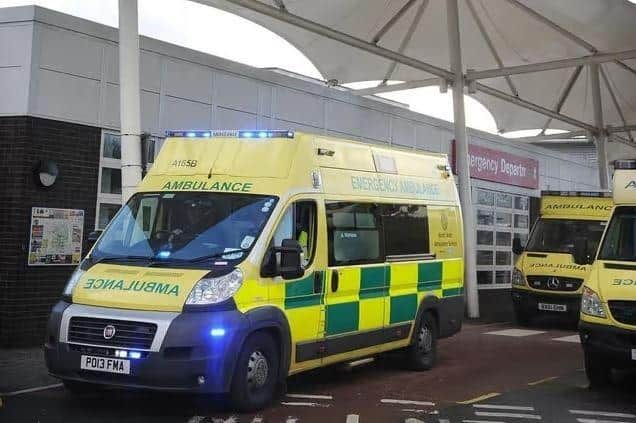'Staff shortages to blame for ambulance delays and NHS pressures', Lancashire councillor says
and live on Freeview channel 276
Lizzi Collinge, the opposition Labour group’s shadow cabinet member for health and wellbeing on Lancashire County Council, was speaking after figures released last week revealed that the average wait for a paramedic in the North West – for people suffering from the likes of a stroke or heart attack – stood at 1 hour 12 minutes in December.
That is nearly an hour longer than the target average response time for so-called “category 2” urgent calls, which is set at just 18 minutes. The region did, however, perform better than England as a whole, where the mean wait was almost 1 hour 33 minutes.
Advertisement
Hide AdAdvertisement
Hide AdThe North West also fell short of the aim of responding to the most serious, life-threatening callouts within seven minutes – taking almost ten.


The long waits for ambulance arrivals are set against the backdrop of many of them being tied up at hospitals where they are unable to transfer their patients to the care of often overcrowded A&E departments. Last month, they hit an all-time high nationally, with more than 18,720 patients waiting more than an hour to be handed over during the week between Boxing Day and New Year’s Day.
County Cllr Collinge said that the stats were all symptomatic of a failure to plan in the past for the staff that an under-pressure health service needs now. She also championed her national party’s policy of ditching the “non-dom” status available to some of the richest people residing in the country – but who pay tax only on a proportion of their income – in order to fund what Labour leader Sir Keir Starmer recently pledged would be “the biggest NHS training programme in its history”.
“The multiple crises we see in the NHS today are a direct result of long-term neglect and incompetence by the Conservative government. For 12 years, they have ignored the need for careful workforce planning in the NHS and social care, whilst overseeing a drop in living standards and preventative healthcare that has made people more poorly overall.


Advertisement
Hide AdAdvertisement
Hide Ad“The key reason we have ambulances backing up is because there are not enough staffed beds – and the main reason [for that] is because people can’t get the social care packages they need to safely leave hospital. This is partly caused by an increase in demand due to more people living with ill-health and disabilities, but also by a huge shortage of care workers, who often get paid less than other key workers such as supermarket staff.
“There are also huge vacancy rates in nursing, medicine and other key healthcare roles, because the government has consistently failed to recruit and retain enough staff,” County Cllr Collinge said.
The Local Democracy Reporting Service approached the Department for Health and Social Care for comment and was told that addressing ambulance handover delays “is a key priority”.
A spokesperson said: “NHS England is providing targeted support to some of the hospitals facing the greatest delays…helping them to identify short and longer-term interventions to improve delays and get ambulances swiftly back out on the road. This is alongside work to help other trusts identify the root causes of handover delays and implement best practice.
Advertisement
Hide AdAdvertisement
Hide Ad“NHS England has allocated £150 million of additional funding for ambulance service pressures in 2022/23, and £20 million to upgrade the ambulance fleet, while the number of NHS ambulance staff and support staff has increased by over 40 percent since September 2010.
“We’re also speeding up hospital discharge, backed by £500 million, to free up hospital beds, improving flow through hospitals and speeding up handovers and get ambulances back on the road faster.
“[Last week], the government announced an additional £50 million capital funding to upgrade and expand hospitals including new ambulance hubs and facilities for patients about to be discharged,” the DHSC added.
St John Ambulance has also been contracted to provide up to 5,000 hours of “national surge capacity” per month during periods of increased pressure on regional ambulance services. That is to allow NHS ambulance crews “to focus on responding to emergency calls”, the department added.
Advertisement
Hide AdAdvertisement
Hide AdMeanwhile, County Cllr Collinge said that Labour would address what she described as the “workforce crisis” by increasing healthcare training places.
“We would pay for this by abolishing the unfair ‘non-dom’ status that the super-rich use to avoid paying their fair share of tax. This would mean enough staff in hospitals, shorter waiting lists and, most importantly, everyone being able to get the care they need, when they need it.”
Non-dom – or ‘non-domiciled’ - residents are individuals who live in the UK, but have a permanent home in another country, where they pay the majority of their tax. That means non-doms would not pay UK tax on overseas income unless it was received in – or brought to – this country.
A study last year by the London School of Economics (LSE) calculated that UK-based non-doms receive at least £10.9 billion in offshore income and capital gains each year, which they are not required to pay tax on in the UK. If they were, the report said, it would “raise more than £3.2 billion in additional tax revenue each year and also remove the current disincentive to invest in the UK”.
Advertisement
Hide AdAdvertisement
Hide AdHM Revenue and Customs estimates that the 68,300 non-doms living here during the 2021/22 tax year were liable to pay £7.9bn in income tax, capital gains tax and national insurance contributions, in spite of their status.
It has been argued that scrapping non-dom status would result in an exodus of those who benefit from the arrangement – taking whatever contribution they do make to the UK with them. But the LSE research concludes that fewer than 100 non-doms would quit the country in that scenario.
A £30,000 annual fee was introduced for non-dom status in 2008, rising to £60,000 if the person has been resident in the UK for 12 out of the last 14 tax years. A 15-year cap was also later introduced on the duration that someone can claim the status.
